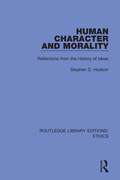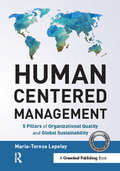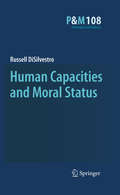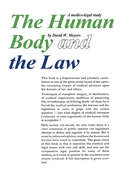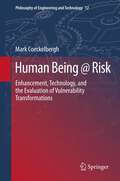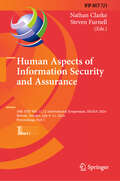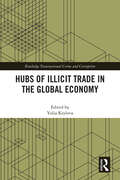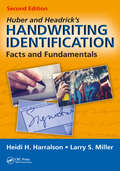- Table View
- List View
Human Cloning
by Kerry Lynn MacintoshMany people think human reproductive cloning should be a crime-some states have even outlawed it and Congress is working to enact a national ban. However, if reproductive cloning soon becomes a reality, it will be impossible to prevent infertile couples and others from choosing the technology, even if they have to break the law. While most books on cloning cover the advantages and disadvantages of cloning technology, Illegal Beings describes the pros and cons of laws against human reproductive cloning. Kerry Lynn Macintosh, an attorney with expertise in the area of law and technology, argues that the most common objections to cloning are false or exaggerated, inspiring laws that stigmatize human clones as subhuman and unworthy of existence. She applies the same reasoning that was used to invalidate racial segregation to show how anti-cloning laws, by reinforcing negative stereotypes, deprive human clones of their equal protection rights under the law. Her book creates a new topic within constitutional law: existential segregation, or the practice of discriminating by preventing the existence of a disfavored group or class. This comprehensive and novel work looks at how anti-cloning laws will hurt human clones in a fresh perspective on this controversial subject. Kerry Lynn Macintosh is a member of the Law and Technology faculty at Santa Clara University School of Law. She is the author of papers, articles, and book chapters on the law and technology and has contributed to the Harvard Journal of Law and Technology, Boston University Journal of Science and Technology Law, and Berkeley Technology Law Journal.
Human Choice in International Law
by Anna Spain BradleyHuman Choice in International Law is an exploration of human choice in international legal and political decision making. This book investigates the neurobiology of how people choose and the history of how personal choice has affected decisions about international peace and security. It charts important decision moments in international law about genocide, intervention into armed conflict and nuclear weapons at the central institutions of the international legal order. Professor Spain Bradley analyzes the role that particular individuals, serving as international judges or Security Council representatives, play in shaping decision outcomes and then applies insights from neuroscience to assert the importance of analyzing how cognitive processes such as empathy, emotion and bias can influence such decisionmakers. Drawing upon historical accounts and personal interviews, this book reveals the beauty and struggle of human influences that shape the creation and practice of international law.
Human Character and Morality: Reflections on the History of Ideas
by Stephen D. HudsonOriginally published in 1986, this book explores the animating qualities of human character and moral thought and discusses how they place constraints on the adequacy of moral theories. It evaluates some of the major theories in the history of ethics, notably the moral thoughts of Sidgwick, Kant, Aristotle and Hume. The book examines questions of fundamental importance to all of us and broadens the scope and wisdom of analytical philosophy by conveying the excitement of original philosophical research.
Human Challenge Studies in Endemic Settings: Ethical and Regulatory Issues (SpringerBriefs in Ethics)
by Michael J. Selgelid Euzebiusz JamrozikThis open access book provides an extensive review of ethical and regulatory issues related to human infection challenge studies, with a particular focus on the expansion of this type of research into endemic settings and/or low- and middle-income countries (LMICs). Human challenge studies (HCS) involve the intentional infection of research participants, and this type of research is rapidly increasing in frequency worldwide. HCS are widely considered to be an especially promising approach to vaccine development, including for pathogens endemic to LMICs. However, challenge studies are sometimes controversial and raise complex ethical issues, some of which are especially salient in endemic and/or LMIC settings. Informed by qualitative interviews with experts in infectious diseases and bioethics, this book highlights areas of ethical consensus and controversy concerning this kind of research. As the first volume to focus on ethical issues associated with human challenge studies, it sets the agenda for further work in this important area of global health research; contributes to current debates in research ethics; and aims to inform regulatory policy and research practice. Insofar as it focuses on HCS in (endemic) settings where diseases are present and/or widespread, much of the analysis provided here is directly relevant to HCS involving pandemic diseases including COVID19.
Human Centered Management: 5 Pillars of Organizational Quality and Global Sustainability (Human Centered Management)
by Maria-Teresa LepeleyWe have never had more freedom to acquire information to make decisions, and organizations have never been so pressed to demonstrate accountability as they communicate with better informed customers and users. People who work IN an organization must also work FOR the organization to accomplish its mission. In this environment, humans are no longer just a resource; they are the reason an organization exists. New constructs are needed to ensure this human-centered paradigm shift.This book sets out the rationale for this shift and stimulates the discussion and the discovery of effective approaches and solutions to innovate for social and environmental good. Written by an expert in quality standards, the book offers a coherent model which synchronizes the organizational structure with the talent required to develop resilient and agile work environments. New strategies to develop talent will be critical, and multidisciplinary approaches from scholars and practitioners from around the world will be required to effectively collaborate and articulate the solutions. The proposition in the book focuses on continuous improvement and interdisciplinary collaboration between scholars and practitioners across different industries, sectors, and national borders in order to address the unavoidable disruptions in the global VUCA environment.
Human Capacities and Moral Status
by Russell DisilvestroMany debates about the moral status of things--for example, debates about the natural rights of human fetuses or nonhuman animals--eventually migrate towards a discussion of the capacities of the things in question--for example, their capacities to feel pain, think, or love. Yet the move towards capacities is often controversial: if a human's capacities are the basis of its moral status, how could a human having lesser capacities than you and I have the same "serious" moral status as you and I? This book answers this question by arguing that if something is human, it has a set of typical human capacities; that if something has a set of typical human capacities, it has serious moral status; and thus all human beings have the same sort of serious moral status as you and I. Beginning from what our common intuitions tell us about situations involving "temporary incapacitation"--where a human organism has, then loses, then regains a certain capacity--this book argues for substantive conclusions regarding human fetuses and embryos, humans in a permanent vegetative state, humans suffering from brain diseases, and humans born with genetic disorders. Since these conclusions must have some impact on our ongoing moral and political debates about the proper treatment of such humans, this book will be useful to professionals and students in philosophy, bioethics, law, medicine, and public policy.
Human Brain Organoids: Scientific and Ethical Considerations (Collaborative Bioethics #4)
by Insoo Hyun Jeantine E. LunshofBrain organoids are small stem cell-derived, self-organizing models of specific brain regions that offer researchers new ways to study the human brain. Since their scientific debut over ten years ago, brain organoids have been used to generate tractable new bioengineered tools for understanding functional interconnectivity of the human brain, dysfunction involved in many neurodegenerative diseases, and certain molecular mechanisms underlying cognition. Despite this field’s considerable scientific promise, advances in human brain organoid research also raise novel philosophical questions and ethical concerns around the use of complex human brain models and the ethical boundaries that should exist when manipulating increasingly realistic bioengineered brain constructs. As researchers generate more realistic organoids in vitro that resemble human brains, it is critically important to understand what ethical boundaries may exist and where researchers and regulators should draw the line for research, both to reduce uncertainties over which projects to pursue in the lab and to address future concerns regulators and the public may harbor about whether this research, if left unexamined, could inadvertently undermine public trust in science. This proposed book delves into ongoing and proactive ethical discussions among ethicists and the neuroscientists involved with this cutting-edge work. Its ultimate goal is to foster greater awareness, understanding, and guidance for future management of ethical issues that may be unique to new areas of brain organoid research. This volume is the result of a close partnership between ethicists and scientists, each informing the other through a collaborative process of joint bioethical deliberation.
Human Body and the Law: A Medico-legal Study (Edinburgh Law And Society Ser.)
by Robert Maynard HutchinsIn this admirably objective and lucid exposition, the author examines from a medico-legal standpoint the comparative position in various countries, particularly in the UK and the USA, of currently controversial medical procedures: voluntary sterilisation, compulsory sterilisation and castration, trans-sexualism, experimentation, transplantation, and euthanasia - few of which, if any, enjoy a settled or clearly defined place in the eyes of the law. He considers the problems from two perspectives: first, that of the individual in society and how far he himself may determine the extent of physical intrusion on his body; secondly, that of the state or society and how far it may impose or limit medical intrusion on the human body. Thus, Mr. Meyers provides a valuable account, not only of current medical attitudes, but also of relevant case and statute law as it stands at present.It is inherent in the nature of this book that it should arouse controversy and argument. There are many important questions to be debated: Has the state the right to enforce its conception of morality without showing that the behaviour it proscribes has a harmful effect on other members of society? To what extent does consent by the individual concerned insulate a surgeon from criminal liability? In connection with compulsory sterilisation, who is to judge those unfit to procreate? What is a proper definition of medical experimentation? What constitutes death? If a man has a right to live has he not an equal right to die?These are a few of the issues raised. The author has not hesitated to express his own opinions but has clearly relegated them to the summary at the end of each chapter, thereby leaving the objectivity of his main text unimpaired.David W. Meyers is a practicing lawyer in California, with American and British legal qualifications at the firm of Dickenson, Peatman & Fogarty. He has taught at the University of Edinburgh Law School and the University of Tasmania Law School as well as
Human Being @ Risk: Enhancement, Technology, and the Evaluation of Vulnerability Transformations
by Mark CoeckelberghWhereas standard approaches to risk and vulnerability presuppose a strict separation between humans and their world, this book develops an existential-phenomenological approach according to which we are always already beings-at-risk. Moreover, it is argued that in our struggle against vulnerability, we create new vulnerabilities and thereby transform ourselves as much as we transform the world. Responding to the discussion about human enhancement and information technologies, the book then shows that this dynamic-relational approach has important implications for the evaluation of new technologies and their risks. It calls for a normative anthropology of vulnerability that does not ask which objective risks are acceptable, how we can become invulnerable, or which technologies threaten human nature, but which vulnerability transformations we want. To the extent that we can steer the growth of new technologies at all, this tragic and sometimes comic project should therefore be guided by what we want to become.
Human Aspects of Information Security and Assurance: 18th IFIP WG 11.12 International Symposium, HAISA 2024, Skövde, Sweden, July 9–11, 2024, Proceedings, Part II (IFIP Advances in Information and Communication Technology #722)
by Nathan Clarke Steven FurnellThe two-volume set IFIP AICT 721 +722 constitutes the proceedings of the 18th IFIP WG 11.12 International Symposium on Human Aspects of Information Security and Assurance, HAISA 2024, held in Skövde, Sweden, in July 9–11, 2024. The 39 full papers presented were carefully reviewed and selected from 55 submissions. The papers are organized in the following topical sections: Part I - Management and Risk; Social Engineering; Technical Attacks and Defenses; Usable Security. Part II - Awareness and Education; Privacy.
Human Aspects of Information Security and Assurance: 18th IFIP WG 11.12 International Symposium, HAISA 2024, Skövde, Sweden, July 9–11, 2024, Proceedings, Part I (IFIP Advances in Information and Communication Technology #721)
by Nathan Clarke Steven FurnellThe two-volume set IFIP AICT 721 + 722 constitutes the proceedings of the 18th IFIP WG 11.12 International Symposium on Human Aspects of Information Security and Assurance, HAISA 2024, held in Skövde, Sweden, in July 9–11, 2024. The 39 full papers presented were carefully reviewed and selected from 55 submissions. The papers are organized in the following topical sections: Part I - Management and Risk; Social Engineering; Technical Attacks and Defenses; Usable Security. Part II - Awareness and Education; Privacy.
Human Aspects of Information Security and Assurance: 17th IFIP WG 11.12 International Symposium, HAISA 2023, Kent, UK, July 4–6, 2023, Proceedings (IFIP Advances in Information and Communication Technology #674)
by Nathan Clarke Steven FurnellThis book constitutes the proceedings of the 17th IFIP WG 11.12 International Symposium on Human Aspects of Information Security and Assurance, HAISA 2023, held in Kent, United Kingdom, in July 2023. The 37 full papers presented in this volume were carefully reviewed and selected from 54 submissions. They are organized in the following topical sections: education and training; management, policy and skills; evolving threats and attacks; social-technical factors; and research methods.
Human Aspects of Information Security and Assurance: 16th IFIP WG 11.12 International Symposium, HAISA 2022, Mytilene, Lesbos, Greece, July 6–8, 2022, Proceedings (IFIP Advances in Information and Communication Technology #658)
by Nathan Clarke Steven FurnellThis book constitutes the proceedings of the 16th IFIP WG 11.12 International Symposium on Human Aspects of Information Security and Assurance, HAISA 2022, held in Mytilene, Lesbos, Greece, in July 2022. The 25 papers presented in this volume were carefully reviewed and selected from 30 submissions. They are organized in the following topical sections: cyber security education and training; cyber security culture; privacy; and cyber security management.
Human Action in Business: Praxiological and Ethical Dimensions
by Wojciech W. Gasparski Leo V. RyanPraxiology deals with working and doing from the point of view of effectiveness. It has three components: analysis of concepts involving purposive actions; critique of modes of action from the viewpoint of efficiency; and normative advisory aspects in recommendations for increasing human efficiency. This fifth volume of the Praxiology series is devoted to Human Action in Business: Praxiological and Ethical Dimensions. The adjective praxiological here means not only related to praxiology as human theory, but also assessed against the dimensions of effectiveness and efficiency. Adding also the ethical dimension, one defines the universe of the discourse about conduct characteristic of business, the economy, and management.Topics in business and management philosophy and theory are discussed by eminent contributors from different corners of the world: P. Ulrich (Switzerland); M. Bohata (Czech Republic); S. K. Chakreborty (India); J. Donaldson, H.E. Sternberg, and P. Graham (U.K.); H. van Lujik and H. Hummels (The Netherlands); O. Loukola (Finland); Y. Pesqueux and I. Tovey (France); T.A. Mathias (India); W. W. Gasparski, A. Lewicka-Strzalecka and J. Sojka (Poland); M. Tamari (Israel); R. E. Freeman, R. G. Kennedy, S. Natale, J. A. Matel, N. Bowie, D. McCann, L. V. Ryan, P. Werhane, and K. Goodpaster (United States). Selected speeches by Pope John Paul II addressed to managers, businessmen, and general audiences involved in the economy are also included in this volume.In Volume 5, invited specialists examine the praxiological and ethical aspects of human action under the rubric of the "Triple E": Efficiency, Effectiveness, and Ethics. The volume opens with contributions reflecting on the praxiological and ethical foundations for business followed by sections discussing human action from the perspectives of religious beliefs and cultural diversity. Another section illustrates the application of these principles to business. The concluding chapters examine praxiology and ethics as the moral agenda for professional education. The volume is a must read for economists, businesspeople, social scientists, and policymakers.
Human - Wildlife Conflicts in Europe
by Felix Rauschmayer Niels Jepsen Klaus Henle Reinhard A. Klenke Irene Ring Andreas KranzThis book is about conflicts between different stakeholder groups triggered by protected species that compete with humans for natural resources. It presents key ecological features of typical conflict species and mitigation strategies including technical mitigation and the design of participatory decision strategies involving relevant stakeholders. The book provides a European perspective, but also develops a global framework for the development of action plans.
Hugo Grotius on the Law of War and Peace
by Stephen C. NeffDespite its significant influence on international law, international relations, natural law and political thought in general, Grotius's Law of War and Peace has been virtually unavailable for many decades. Stephen Neff's edited and annotated version of the text rectifies this situation. Containing the substantive portion of the classic text, but shorn of extraneous material, this edited and annotated edition of one of the classic works of Western legal and political thought is intended for students and teachers in four primary areas: history of international law, history of political thought, history of international relations and history of philosophy.
Hubs of Illicit Trade in the Global Economy (Routledge Transnational Crime and Corruption)
by Yulia KrylovaThis book meticulously examines how centers of illicit trade pose myriad threats to global security and sustainable development. The exponential growth of illicit trade, resulting in annual losses amounting to trillions of dollars for the global economy, is increasingly concentrated within specific geographic areas. These locales serve as safe havens for smugglers and their accomplices, fostering a criminal ecosystem that facilitates the convergence of various criminal activities. The book underscores the detrimental impact of poorly regulated international free trade zones, which prioritize expediency over security, thereby allowing illicit trade to flourish in regions characterized by opaque governance and lax regulatory oversight. It comprehensively explores the spectrum of illicit trade present in notorious hubs such as the Argentina-Brazil-Paraguay Tri-Border Area, Dubai, Panama, Belize, Guatemala, and Ukraine. Emphasizing the phenomenon of crime convergence associated with these hubs, the book offers actionable recommendations for disrupting their interconnected illicit supply chains, infrastructures, and networks. By addressing this interconnectedness, the book fills a critical void in understanding how vulnerabilities within the global economy fuel the creation of illicit trade hubs. It will be of great value to researchers in the fields of trade, economics, criminology, and international development. It will also be an excellent resource for government agencies, policymakers, and private-sector managers in those industries most affected by the growing problem of illicit trade.
Huber and Headrick's Handwriting Identification: Facts and Fundamentals, Second Edition
by Larry S. Miller Heidi H. Harralson"Forensic document examination is the study of physical evidence and physical evidence cannot lie. Only its interpretation can err. Only the failure to find it, or to hear its true testimony can deprive it of its value."—Roy Huber This is a comprehensive update of Huber and Headrick's seminal work on handwriting examination. New coverage includes a review of forensic handwriting examination research, handwriting analysis training and proficiency, revised methods and procedures, an updated listing and clarification of terminology and electronic signatures, the analysis of digitized handwriting, and other related technological advances. The book includes updated photographs, several added illustrations, and advances in techniques based on the scientific research conducted in the area over the last 20 years. Features of the new edition include: The latest on electronic signatures, digital handwriting, automated handwriting verification, and the many advances in technology and research over the last two decades An overview of the fundamentals of handwriting examination with updated discussion of the intrinsic and extrinsic variables associated with handwriting identification A review of the criticism of handwriting expert opinions and methodology, addressing both the strengths and scientific limitations of the area Fully revised while remaining true to the spirit and approach of original authors Roy Huber and A. M. Headrick Addition of nearly 200 new references and new glossary terms representing advances in research and methods. With extensive photographs to help clearly illustrate concepts, Huber and Headrick’s Handwriting Identification: Facts and Fundamentals, Second Edition serves as an invaluable reference to law libraries, practicing document examiners, forensic and criminal justice students, and every lawyer handling cases in which the authenticity of handwriting and documents might be disputed.
Hub-and-Spoke Cartels: Why They Form, How They Operate, and How to Prosecute Them
by Joseph E. Harrington Luke Garrod Matthew OlczakThe first comprehensive economic and legal analysis of hub-and-spoke cartels, with detailed case studies.A cartel forms when competitors conspire to limit competition through coordinated actions. Most cartels are composed exclusively of firms that would otherwise be in competition, but in a hub-and-spoke cartel, those competitors (&“spokes&”) conspire with the assistance of an upstream supplier or a downstream buyer (&“hub&”). This book provides the first comprehensive economic and legal analysis of hub-and-spoke cartels, explaining their formation and how they operate to create and sustain a collusive environment. Sixteen detailed case studies, including cases brought against toy manufacturer Hasbro and the Apple ebook case, illustrate the economic framework and legal strategies discussed. The authors identify three types of hub-and-spoke cartels: when an upstream firm facilitates downstream firms to coordinate on higher prices; when a downstream intermediary facilitates upstream suppliers to coordinate on higher prices; and when a downstream firm facilitates upstream suppliers to exclude a downstream rival. They devote a chapter to each type, discussing the formation, coordination, enforcement, efficacy, and prosecution of these cartels, and consider general lessons that can be drawn from the case studies. Finally, they present strategies for prosecuting hub-and-spoke collusion. The book is written to be accessible to both economists and lawyers, and is intended for both scholars and practitioners.
Huawei Wisdom: Develop Strategy to Execution at Critical Moments
by Lan TaoThis book reviews the three life-and-death crisis moments that Huawei experienced during its growth and the major transformation process triggered by these crises. It describes in detail how Huawei thinks about future strategies at these critical moments and how to implement these strategies during its daily work. This book involves the content of corporate globalization strategy decision making, overseas marketing, change management, etc.This book is suitable for middle and senior managers of the enterprises facing difficulties in product development, market development, and business model transformation, especially in the information and communication industry, manufacturing, etc. And it helps to inspire researchers and students, consultants, and trainers who major in corporate transformation, strategic management, and international marketing.
Howard County Law Enforcement (Images of America)
by Tom Kelley Jon ZeckSince the 1880s, when a Howard County sheriff's deputy shot the mayor of Kokomo during the commission of a burglary, Howard County law enforcement officers have played an important role in the community's history. Police officers, deputies, and troopers cleared rowdies out of the junction neighborhood, walked downtown beats, rescued tornado survivors, quelled civil disturbances, cleaned up tragic accidents, and solved grisly murders. By the mid-1940s, a new generation of war veterans came home with a spirit of progress and experience in leadership. The foundation of compassion, perseverance, and integrity they established in Howard County law enforcement has defined their unswerving commitment to the safety of the community and to one another. Images of America: Howard County Law Enforcement tells their story.
How to pass the APC
by Austen ImberGraduates undertaking the RICS Assessment of Professional Competence (APC) often find that, in addition to the general information provided by the RICS, guidance is needed on specific areas of their work as general practice surveyors. How to Pass the APC: Essential Advice for General Practice Surveyors has been built around the needs of general practice surveyors, and guides you through the APC process in line with your own competencies – including valuation, marketing, landlord and tenant, estate management, rating, and planning and development work, together with more specialist areas. The author highlights the essentials, showing you how to approach the presentation and interview, providing a bank of examples of real APC questions, together with illustrative responses to demonstrate how the interview process works. Accessible and easy to use, this book gives you comprehensive coverage of the fundamental elements and is a must read for anyone taking the APC.
How to find success as a Criminal Justice faculty member
by Craig HemmensProfessional development is an issue of interest to all criminal justice faculty, from the newest Assistant Professor to the most senior Full Professor. The annual Academy of Criminal Justice Sciences conference has a number of panels and workshops that deal with the wide variety of issues that criminal justice faculty deal with as they move though their career. These panels are well-attended, attesting to the interest that faculty have in this topic. Given the importance of staying apprised of changes in the discipline, from hiring expectations to tenure and promotion requirements, the fact that academic study of criminal justice has changed a great deal in the past decade, and that more is now expected of graduate students, pre-tenure faculty, and even senior faculty, this book is an attempt to address some of the most important topics that those engaged in the academic study of criminal justice are faced with as they move through their career. Each chapter is written by a well-regarded academic with experience in the area upon which they are writing. This book was originally published as a special issue of the Journal of Criminal Justice Education.
How to be a Successful Frauditor
by Peter TicknerThis book shows how anyone who finds they need to investigate a fraud at work can conduct a successful investigation and maximise their chances of recovering stolen money. Drawing on the experiences of the author, including his role in a number of high profile cases at two organisations at the heart of government, the Treasury and the Metropolitan Police, the book is peppered with real life examples and case studies of the 'frauditor's' experiences, and lessons learned the hard way including the cases of: - The linguist who was lost for words - Doctoring the suits at the hospital - A magician at work - Corporate credit cards for cops Readable, and written to de-bunk the mysteries of fraud investigation, this book includes interactive case studies to develop the reader's skills in effective fraud detection and investigation.
How to be Nowhere
by Tim MacGabhannLife is finally on the right track for reporter and recovering addict Andrew: he is slowly coming to terms with the murder of his photographer boyfriend Carlos, pursuing sobriety and building a new home with a new partner. Andrew has almost forgotten about the story that ruined his life - but that story hasn't forgotten about him, and a series of deadly threats forces him into helping the very man whose gang murdered his boyfriend and left him homeless.A literary take on the classic chase movie, HOW TO BE NOWHERE is the sequel to Tim MacGabhann's genre-busting and critically-acclaimed debut CALL HIM MINE, and a blistering thrill-ride deep into the fog of Central America's murky present and tragic future.


